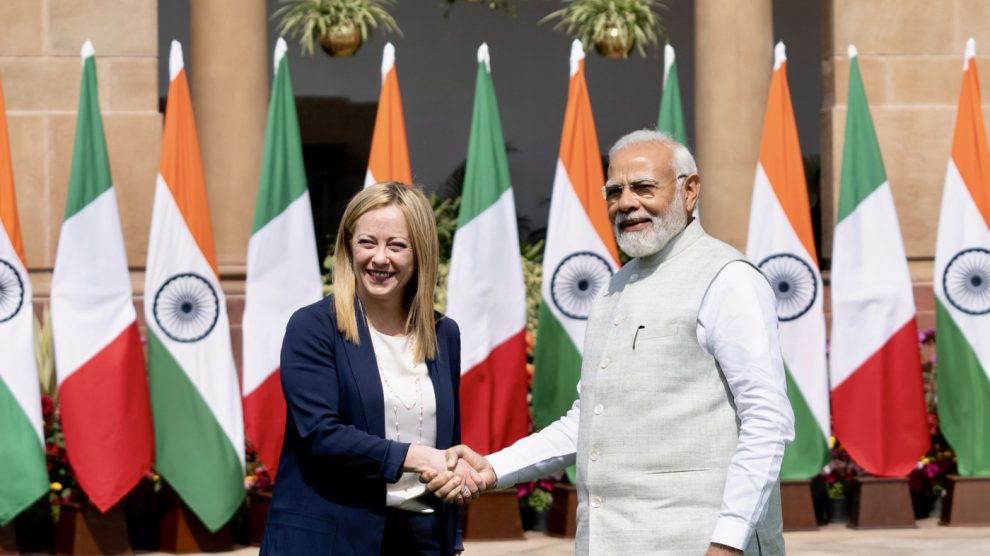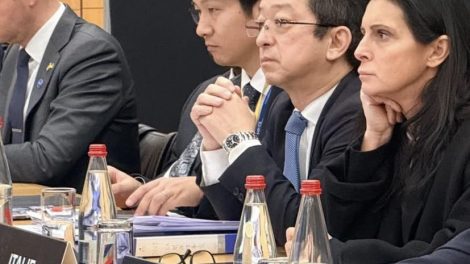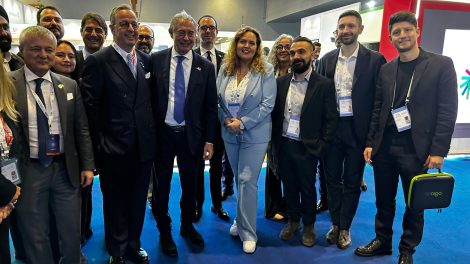Giorgia Meloni in India. The Italian Prime Minister landed in New Delhi, where she was received by her Indian counterpart Narendra Modi on the 75th anniversary of bilateral relations between their two countries. The two announced the upgrading of the Italy-India relations to “strategic,” officially leaving behind a decade of strained ties.
- Ms Meloni noted cooperation could expand across sectors, “such as defence, energy security, digital transition, emerging technologies, cybersecurity, space. These are strategic subjects on which we want to collaborate, and we believe that much more can be done.”
- They then touched on more contingent issues, such as the war in Ukraine, with the Italian PM remarking that the Indian-led G-20 can “facilitate negotiations towards a just peace.”
A matter of values. The two also took part in the Raisina Dialogue, where Ms Meloni, as guest speaker, mapped the deeper nature of relations between Rome and New Delhi. “Italy and India share a profound conviction. That only the rule of law can allow humanity to prosper and develop in balance and harmony. As forward-looking countries […] we have a common, human-centric vision, in which democracy, science, peace and prosperity go hand in hand,” she said.
- “Every Nation can be a lighthouse, with the wealth and pride of its tradition and identity. Lighthouses do not obscure each other, but they can shine together and help all of us to navigate in troubled waters.”
Upgrading (defence) ties… In their meeting, PMs Meloni and Modi signed a bilateral agreement to improve cooperation across sectors. Defence, as anticipated, was the bedrock of the rapprochement. The Italian government underscored the agreement “will facilitate the development of industrial partnerships, exchanges of information and training courses.” And PM Modi explained he and his Italian homologue “[had] decided to organise joint exercises and training courses between the respective Armed Forces,” setting the fight against terrorism and separatism as a priority.
- The Indian Prime Minister remarked that increased cooperation in the defence sector would “new opportunities for development,” also with regard to production, to the “benefit of both countries.”
- That’s a key opportunity for Italian companies (including Leonardo, Fincantieri, and Elettronica) to relaunch their activities in India – a vast market with long-term security needs.
- New Delhi, on its part, will gain access to more Italian (and overall Western) know-how and equipment to decrease its historical reliance on Russian military equipment.
… the trade relations… Through bilateral instruments and broader programmes such as the Global Gateway, remarked the Italian PM, Europe is strengthening its collaborations in the Indo-Pacific (as well as South America and Africa) on all fronts, from connectivity to infrastructure and fair and sustainable trade.
- As Stefania Benaglia, Head of the Global Connectivity Programme at CEPS, told our sister website, the point is to turn this connectivity into a force multiplier for Italy. “The Global Gateway is a very important game that is also being played in the Indo-Pacific, and where India is the beating heart for this European strategy.”
- “Italy has a great opportunity to be present and to play a leading role in determining the standards on which investments, foreign policy and economic-commercial policy will move in the future in terms of public-private relations.”
… as well as tech and security. Speaking at the conference, PM Meloni highlighted there are “many elements on which there is full convergence” between Rome and New Delhi, which are “working on very important projects that connect our nations; these are strategic subjects on which we want to collaborate.” She then announced Italy’s participation in the Indo-Pacific Oceans Initiative.
- The IPOI’s underlying concept is based on the “Security And Growth for All in the Region” (SAGAR) initiative, announced by PM Modi in 2015. It’s one of the region’s defining systems of cooperation and dialogue, intended to create areas of diplomatic and operational contact in such an immense and complex region.
- The vision encourages States to cooperate with synergistic efforts towards a safe, secure and stable maritime domain, as well as its conservation – areas in which Italy can bring its expertise to bear, as it shares with India a likeness in geomorphology.
Bridging the Med and the Indo-Pacific. The IPOI framework is based on liberal theoretical viewpoints and advocates an open, inclusive global initiative by means of practical cooperation, seeking to create a sense of community between like-minded countries. Italy, which is increasingly interested in the concept of indivisible security and the need to contain autocracies around the globe, is seeking a strategic projection point for the Indo-Pacific.
- Rome recently increased its commitment by sending the Morosini, a Paolo Thaon di Revel-class offshore patrol vessel, for patrolling activities alongside allied activities.
- It also upgraded its relations with Tokyo to a “strategic partnership” and is working on expanding cooperation across security sectors, including through developing the next-gen fighter jet.
“What happens in Europe affects the Indo-Pacific in ways it would not have in the past. And what happens in the Indo-Pacific has direct repercussions in Europe,” said Ms Meloni. “We speak of an enlarged Mediterranean, and we consider it enlarged [until] here; there is a connection between the Med and the Indo-Pacific that we want to strengthen.”
Next stop: the United Arab Emirates, where PM Meloni is expected on Friday. Also, Italian and Israeli diplomacies are working on a top-level meeting between PM Meloni and her Israeli counterpart Binyamin Netanyahu, which could take place as soon as next week in Rome.
- As we wrote, all three visits are conducive to deeper integration within the I2U2 format, the mini-lateral mechanism through which Israel, India, the UAE and the United States cooperate on matters of energy, water, food, health, space and security…
- … and there’s an opportunity for Italy, as it reconsiders its ties with China and increases its investment in the security of the Indo-Pacific region, to become the third “I”.





